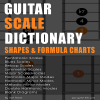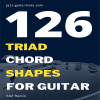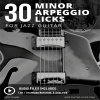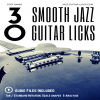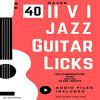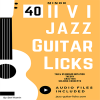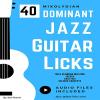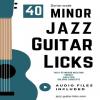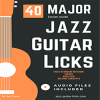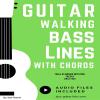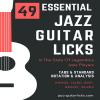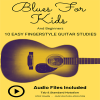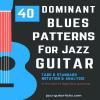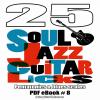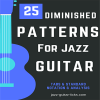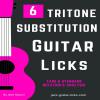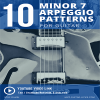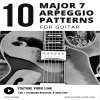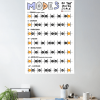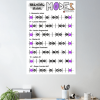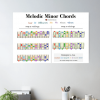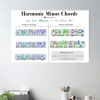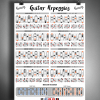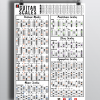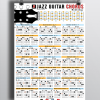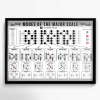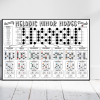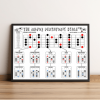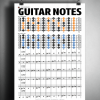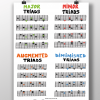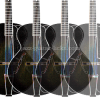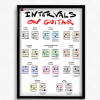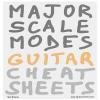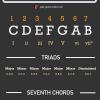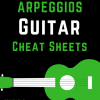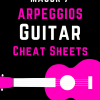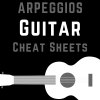Minor Triad Chords | Close, Open and Inverted Voicings | Guitar Diagrams
A minor triad is a three-note chord built with a root, a minor third, and a perfect fifth.
This guitar lessons provides the main voicing shapes and some basic exercises for a better understanding of minor triads.
Construction
Minor triads are constructed by stacking three notes : the root (tonic), major third and perfect fifth of any minor scale, thus giving the interval formula 1, b3, 5.
As shown in the chart below, an A minor triad is made up of A (root), C (minor third) and E (perfect fifth).
In comparison with major triad chords, the third is lowered by a semitone.
| A minor scale | A | B | C | D | E | F | G |
| Formula | 1 | 2 (9) | b3 | 4 (11) | 5 | b6 (b13) | b7 |
| A minor triad | 1 | X | b3 | X | 5 | X | X |
Guitar Triads - Lesson With Shapes & Formulas (major, minor, diminished, augmented, suspended)
Close Voicings
You will find below 4 guitar diagrams containing 12 minor triad chord shapes in closed position.
Close voicings are those where the root position, and all inversions, fit within the space of one octave.
The interval structures for close voiced minor triads are :
- R b3 5
- b3 5 R
- 5 R b3
| Root position | R | b3 | 5 |
| 1st inversion (third in the bass) | b3 | 5 | R |
| 2nd inversion (fifth in the bass) | 5 | R | b3 |
Remember that inverted chord is a chord whose notes are arranged in a different order.
It means that the bass can be the third or the fifth instead of the usual root note, thus giving different voicings.
Open Voicings
Open voiced triads provide a great way to expand your chord vocabulary, they are very useful for comping, composing or for chord melody arrangements.
What is An Open Voiced Triad?
An open voiced triad is built by moving the middle note of a closed voicing up on octave.
Let's take an example with a C minor triad (close voicing).
It is built with C, the root, Eb the minor third and G, the fifth. To build a open voicing, you have to move the middle note that is Eb an octave up.
This way you get a new voicing : C (Root), G (fifth), Eb (minor third).
Now you can repeat this operation with the two inverted closed minor triads to obtain two other open minor triad voicings.
| Root position (root in the bass) | R | 5 | b3 |
| 1st inversion (minor third in the bass in the bass) | b3 | R | 5 |
| 2nd inversion (fifth in the bass) | 5 | b3 | R |
CLOSED VOICINGS : The notes are as close together as possible, all included in one octave.
OPEN VOICINGS : The notes are spread over more than an octave.
Here are three guitar diagrams each containing three open minor triad shapes.
The root chord R 5 b3 is in blue. The first inversion b3 R 5 is in red and the second inversion 5 b3 R is in green.
Triad Pairs
Minor triads can be used by pairs, this is what we call "the triad pairs technique".
It's a simple principle employed by many jazz improvisers.
The basic used is to take two adjacent minor triads from the diatonic scale that are the ii and iii degrees, e.g with the C major scale.
As you can see the C major scale (just as all the scales) contains three minor chord types related to the second, third and sixth degrees.
Only two triads are adjacent, Dm and Em, the second and third degree.
The triad pairs system consists in playing these two triads over any diatonic chord. In this way you highlight some chord tones as explains below.

Practicing Diatonic Minor Triad Pairs
The examples below show how to practice minor triads using the triad pairs system.
The first exercise consists in playing the two adjacent minor triads of C major in order to cover the sixth string of the guitar using the root voicing (1 - b3 - 5) and the two related inversions (b3 - 5 - 1 and (5 - 1 - b3).
The second tab contains minor triads with basses on the sixth string.
The third tab have minor triads with basses on the fifth string.
Third exercise, basses on the fourth string.
Fourth example, basses on the third string.
Minor Triad Pairs Over Major 2 5 1 Progression
Here is an easy example of use of diatonic minor triad pairs over the iim7 chord of a classic 2 5 1 sequence.
Chords / Minor Triad Relationships
Here is a chart showing what tones are brought out when a minor triad is played starting on a specific interval.
It will help you find new sonorities for your improvisations.
Let's take the sixth row as an example :
When playing a minor triad starting on the major seventh (7) of a major 7 chord, the 7th, 9th and #11 are highlighted.
The example in the sixteenth row show that when playing a minor triad starting on the #4 of a major 7 chord, you bring out interesting altered tones as the #11 and b9.
| CHORD TYPE | MINOR TRIAD STARTING ON | TRIAD | CHORD | TRIAD |
| Major | 3 | 3 5 7 | C | Em |
| Major | 5 | 5 b7 9 | C | Gm |
| Major | 6 | 13 1 3 | C | Am |
| Maj7 | 3 | 3 5 7 | Cmaj7 | Em |
| Maj7#11 | 7 | 7 9 #11 | Cmaj#11 | Bm |
| m | 2 | 9 11 13 | Cm | Dm |
| m | 5 | 5 7 9 | Cm | Gm |
| m7 | 2 | 9 11 13 | Cm7 | Dm |
| m7 | 5 | 5 7 9 | C7 | Gm |
| 7 | 5 | 5 7 9 | C7 | Gm |
| 7 | 6 | 13 1 3 | C7 | Am |
| 7sus4 | 2 | 9 11 13 | C7sus4 | Dm |
| 7sus4(b9) | 7 | 7 b9 11 | C7sus4(b9) | Bbm |
| 7#9 | 1 | 1 #9 5 | C7#9 | Cm |
| 7b9b5 | #4/b5 | #11/b5 13 b9 | C7b9 | F#m |
| 7alt | b2 | b9 3 b13 | C7alt | Dbm |
| 7alt | b3 | #9 #11/b5 7 | C7alt | Ebm |
| m7b5 | 2 | 9 11 13 | Cm7b5 | Dm |
| m7b5 | b3 | b3 b5 7 | Cm7b5 | Ebm |
Upper Structure Minor Triads
The following exercise below show what tones are highlighted when playing the twelve minor triads over the same bass note (C).
The lower stave show the bass note (C) whereas the higher stave show the minor triads.
Example with the fifth bar : when stacking an E minor triad (E-G-B) on a bass of C, we get the third (E), fifth (G) and eleventh (B) of C major.

-
Guitar Scale Dictionary
This E-book is a printable PDF method including over 700 scale diagrams and formula charts for guitarists. -
Guitar Chord Dictionary
This PDF eBook provides over 550 guitar chord shapes. This is the perfect reference guide to understand how chords are built and how to play them on the guitar neck. -
30 Groovy Jazz Guitar Licks
This downloadable package contains a PDF WITH audio files giving access to 30 groovy guitar phrases mixing jazz, blues and funky licks for beginners. -
172 Arpeggio Shapes For Guitar
This printable PDF is a method dedicated to guitarists of all styles who want to learn build and play the most important types of arpeggios. -
126 Triad Chord Shapes
This handbook for guitar players is intended both for teachers and students. It includes 126 guitar shapes for mastering triads. -
Major Scale Harmonization
This package provides a printable PDF with exercises and audio files to learn how to harmonize the major scale with 3 note chords and their extensions. -
30 Minor Arpeggio Licks
This package includes a printable PDF method containing 30 exercises with tabs, staves and audio files for practicing minor arpeggios on guitar. -
II V I Bundle - 170 Exercises
This bundle contains 4 PDF methods for a total of 170 exercises with tabs, staves, analysis & audio files for practicing scales, arpeggios licks & chords over the 2-5-1 progression. -
Diatonic Licks Bundle
This package contains 120 jazz guitar lines based on diatonic modes as Mixolydian, Dorian and Ionian. PDF format with tabs, audio files and analysis. -
30 Smooth Jazz Guitar Licks
In this package you'll get a printable PDF Method with tabs, notation, analysis, scale shapes and audio files for practicing 30 smooth jazz guitar licks. -
40 II V I Jazz Guitar Licks
This pdf method for guitar contains fourteen 2 5 1 jazz guitar lines with tab, standard notation, analysis, scale charts and audio files. -
50 II-V-I voicings
This printable PDF guitar method provides 50 exercises with audio files, analysis, tab and staves for learning major 2-5-1 chord voicings. -
40 Minor 2 5 1 Chord Voicings
This PDF method contains 40 exercices with tabs, scores and audio files for practicing jazz guitar chords over the minor 2 5 1 progression. -
40 Minor II V I Licks
This guitar method is a printable PDF with tabs, diagrams, theory and audio files providing 40 minor 2 5 1 jazz patterns. -
40 Mixolydian Jazz Guitar Lick
PDF guitar method with tabs, audio files and theory providing 40 dominant jazz guitar lines for teachers and students. -
40 Minor Jazz Guitar Licks
This printable guitar method in PDF format contains 40 easy minor jazz guitar lines based on the Dorian mode. -
40 Major Jazz Guitar Licks
Printable PDF eBook method containing 40 major jazz guitar licks with tab, standard notation and audio files for beginners and intermediates. -
Guitar Walking Bass Lines
This jazz guitar method about walking bass lines and chords is available as a PDF files containing 35 exercises with tabs, analysis and audio files -
101 Dominant Arpeggio Patterns
This printable PDF method provides 101 dominant arpeggio exercises with tab, theory and standard notation for the jazz, blues and rock guitarist. -
49 Essential Jazz Lines
This printable eBook method in PDF format provides 49 jazz solo transcriptions of the greatest jazz musicians. Tab, standard notation, audio files & analysis. -
11 Jazz Blues Studies
11 jazz blues chord studies with tabs, standard notation, analysis, and audio recordings and PDF. -
10 Easy Fingerstyle Blues
This PDF with Tabs and audio files provides 10 easy acoustic fingerstyle blues guitar studies for kids and beginners. -
25 Altered Jazz Guitar Lines
This PDF eBook method contains 25 altered jazz guitar licks with tabs, patterns, scale charts and audio files to master, apply and develop the altered scale. -
40 Blues Dominant Patterns
This printable method is available as a PDF file containing 40 easy dominant jazz-blues guitar lines with tabs, standard notation, analysis, audio files and scale charts. -
25 Pentatonic Licks
This jazz guitar method is an eBook available as a PDF with standard notation, guitar tabs, diagrams, analysis, audio files and backing tracks. You will find in this booklet 25 easy jazz guitar lines with theory using common and rare pentatonic scales. -
25 Soul Jazz Guitar Licks
You will find here an eBook available in PDF containing 25 soul jazz and hard bop guitar licks in the style of Grant Green, Melvin Sparks, George Benson. -
25 Diminished Patterns
This eBook PDF with audio files contains 25 dominant diminished jazz guitar patterns using the half-whole diminished scale and diminished 7th arpeggios. -
6 Tritone substitution licks
This Printable PDF eBook available for free download contains 6 easy jazz guitar licks with tabs/notation, youtube video link and analysis about the tritone substitution. -
10 Minor 7 Arpeggio Patterns
This printable PDF eBook offers 10 easy minor 7 arpeggio patterns with its related YouTube video for beginner guitarists. -
10 Easy Major 7 Arpeggio Licks
This is a printable PDF for beginner jazz guitar players providing 10 easy licks to practice major 7 arpeggios. -
10 Chord Melody Lines
Within this package, you'll discover a set of ten chord melody exercises for beginners. Printable PDFaudio files, a backing track, and a link to the associated YouTube video. -
10 Minor Blues Scale Licks
You'll find here a PDF with 10 easy jazz guitar licks to practice the minor blues scale on guitar.
-
Major Scale Modes
This poster is created for music teachers and students, illustrating the structure of the seven modes of the major scale. -
Harmonic Minor Modes
This music theory poster, offered in various sizes, demonstrates the structure of the seven modes of the melodic minor scale. -
Melodic Minor Modes
This music theory poster available in several sizes shows the construction of the seven modes of the melodic minor scale. -
Major Scale Chords
This handy poster provides a clear visual guide to the chords built from the major scale, helping you recognize patterns and improve your playing. -
Melodic Minor Chords
Explore the rich harmonic possibilities of the melodic minor scale with this essential guitar poster. -
Harmonic Minor Chords
Discover the chords of the harmonic minor scale with this guitar poster. -
Guitar Arpeggios Poster
This giant guitar poster for any guitar player, student or instructor contains colorful arpeggio diagrams. Giant size 24 x 36 inches (60 x 90 cm). -
Guitar Scales Poster 24*36
Guitar posters and wall art with eighteen neck diagrams representing the most used scales in music. -
Guitar Chord Poster
This printed color posters contains 63 guitar chord diagrams for jazz players, students, teachers and schools. -
Guitar Modes Poster
Guitar reference posters and wall art about modes of the major scale for guitar teachers, students and music schools. -
Melodic Minor Modes Poster
Educative and decorative giant guitar poster with neck diagrams, interval names about the seven modes of the melodic minor scale. -
Pentatonic Scale Guitar Poster
This guitar reference poster shows the positions and intervals of the major pentatonic scale. -
Guitar Notes Poster
This is a giant poster showing the notes on the guitar fret board and their positions on a musical staff. -
Triads Guitar Poster
This reference poster show the positions and intervals of the main triads used on guitar. This is a useful tool for guitarists, teacher and students. -
Four Archtop Guitars Poster
This is a decorative poster with four archtop jazz guitars. Several size and colors in landscape format available on Teespring and redbubble. -
Intervals On Guitar - Poster
This giant poster for guitar provides neck diagrams with interval positions.
-
Major Scale Modes Handwritten
This is a printable PDF for guitar teachers and students containing seven cheat sheets about the modes of the major scale. -
Music Modes - Cheat Sheets
Unlock the secrets of diatonic modes with our expertly crafted printable PDF cheat sheets, designed specifically for musicians, composers, and music students. -
Modes of The Major Scale
This printable PDF provides 7 diagrams to play medieval church modes on guitar. -
Harmonic Minor Scale Modes
You'll find here a printable PDF file containg guitar charts and diagrams of the seven modes of the harmonic minor scale. -
Melodic Minor Scale Modes
You'll find a printable PDF in high resolution including guitar charts of the seven modes from the melodic minor scale. -
Maj7 Arpeggios - Cheat Sheets
Free major 7 arpeggio cheat sheets for guitar students and teachers. Three files are available for download, PDF, JPEG and PNG. -
Min7 Arpeggio Cheat Sheets
This page contains three music cheat sheets for guitar teachers and students about minor seventh arpeggios -
Dom7 Arpeggio Cheat Sheets
This page contains a link to three cheat sheets about dominant 7 arpeggios. Guitar neck diagrams, theory and chart. -
m7b5 Arpeggio - Cheat Sheets
Three printable cheat sheets for guitar about m7b5 arpeggios for teachers and students. -
Dim7 arpeggio - Cheat Sheets
Three music cheat sheets in PDF , JPEG and PNG formats for guitar teachers and students. -
MinMajor 7 Arpeggio Sheets
Three files (PDF, JPEG, PNG) including minor major 7 arpeggios shapes and theory for guitar teachers and students. -
Augmented Major 7 Arpeggio
You'll find guitar cheat sheets with shapes, theory and formula chart about augmented major 7 arpeggios. -
Augmented 7 Arpeggio - Guitar
This page provides three augmented 7 arpeggio cheat sheets for guitar players.
Last edited: 2025-03-04
Add a comment












